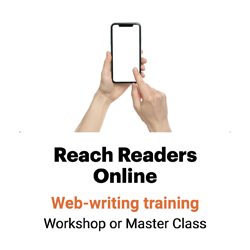People find it difficult to concentrate online
Most Americans spend at least 8.5 hours a day looking at a screen, whether a TV set, computer monitor or mobile device, according to a study by Ball State University. Frequently, we use two or three of these devices at once.

That multitasking costs. According to a study by Stanford University, heavy multitaskers:
- Are more easily distracted by “irrelevant environmental stimuli”
- Can recall much less of what they’ve just learned
- Are much less able to concentrate on the task at hand
Now, where was I going with this? Oh, yes.
“The net is, by design, an interruption system, a machine geared for dividing attention,” writes Nicholas Carr in The Shallows: What the Internet Is Doing to Our Brains.
As we “power browse” a dozen web pages at once, check our email 30 or 40 times an hour and text while driving, we become “distracted from distraction by distraction.”
So don’t count on your web visitors being all there when they show up on your web page.
“Psychological research long ago proved what most of us know from experience: frequent interruptions scatter our thoughts, weaken our memory, and make us tense and anxious,” Carr writes. “The more complex the train of thought we’re involved in, the greater the impairment the distractions cause.”
Links limit learning.
One study at Utah State University tested that theory. Mechanical and manufacturing engineering students studied machining lessons via:
- Linear web pages, where students clicked to move to the next page, like turning the pages in a book
- Linked web pages, where students navigated links on a page to decide which page to visit next
The results?
- Linear learning was faster. Students using the linear lessons finished their studies in half the time that students using the linked module required.
- Linked learning was less effective. Students using the module with links missed 33% more questions on a test than those using the linear web pages. Even simple linking was enough to reduce student scores by two grade points.
- Average learners struggled more with links. A-level students performed equally well with either module. But B- and C-level students fared much worse with the linked pages than with the linear module.
Why? A printed page communicates its argument line by line. That delivers a more coherent view of the world than do short chunks of hyperlinked text.
Plus, navigating links may divert mental energy that people might otherwise spend understanding complex information.
Screen reading cuts comprehension.
When 1 million North Carolina middle-school students received computers and internet access from 2000 to 2005, their math and reading scores declined, found Duke University economists Jacob Vigdor and Helen Ladd.
The reason: They were distracted by the web. (Hey, given the choice between spending the afternoon solving fraction problems or spending it on DumbWaysToDie, I’d go for the website, too!)
The web’s interactive nature also makes the medium harder to understand. After all, it’s not easy to focus on the text when you’re also clicking and navigating.
When participants in one study read Elizabeth Bowen’s “The Demon Lover” in hypertext, for instance, three-quarters had trouble following the story, according to researchers David S. Miall and Teresa Dobson. Just one in 10 who read linear text struggled to understand the story.
The reason? The web readers’ attention, Miall and Dobson said, “was directed toward the machinery of the hypertext and its functions rather than to the experience offered by the story.”
More so on mobile
These problems are multiplied when people read on mobile devices. Mobile web visitors pay less attention to your message, spend less time on it, read more slowly, understand less, remember less and are less likely to act on your call to action.
The communicator’s bottom line?
This is just one more reminder that humans — adults as well as kids — get distracted when reading your messages online.
The solution? get to the point faster, organize better, make it easier to read and more skimmable.
____
Sources: Nicholas Carr, The Shallows: What the Internet Is Doing to Our Brains, W. W. Norton & Company, 2010
Christine Hailey, “Hypermedia, multimedia and reader cognition: an empirical study,” Technical Communication, Aug. 1, 1998

Leave a Reply